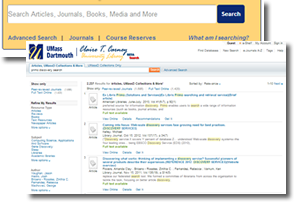 The UMass Dartmouth Claire T. Carney Library and UMass Law library are pleased to announce the unveiling of the new library services platform Alma and the search discovery and access system Primo.
The UMass Dartmouth Claire T. Carney Library and UMass Law library are pleased to announce the unveiling of the new library services platform Alma and the search discovery and access system Primo.
Selected to be part of an Alma Early Adopter Program, UMass Dartmouth Libraries join Boston College and Boston University in Massachusetts to become one of six libraries in the United State to “Go Live” with the cloud-based Ex Libris Alma library unified resource management system and the Primo discovery search and delivery services. The Alma and Primo systems replace the Voyager integrated library system, first implemented in 1999, and the separate SFX, MetaLIB and DigiTool systems.
Benefits to You, the Researcher:
On the front end, Primo is a new search tool that enables the discovery of a wide range of materials like articles, books, images and other forms of electronic resources from a wide variety of sources within one search. Without leaving a search, a researcher will be able to access the available electronic materials online or send the results to email or a citation manager like RefWorks. A short list of advantages include:
- Faster: You search just once to find and access all different kinds of materials.
- Easier: After-search filters let you start with a simple keyword search and then refine your results by simply clicking on the filters you wish to apply.
- bX Recommender: Many citations point to related articles. Recommendations based on data mining and structured analysis of usage data obtained from hundreds of research institutions worldwide.
- Save your research: Save items or searches in a personal e-Shelf, or export them to RefWorks or EndNote.
- Discovery: An advanced researcher may still need to rely on specialized databases in their field. Primo’s multidisciplinary search allows them to quickly discover valuable scholarly resources and information from other sources that they may not have found otherwise.
- Added features: Examples include book covers, material type images, and multiple limiting and sorting options.
On the back office side, Alma allows library staff to move more efficiently through acquisition and metadata phases of work allowing researchers to gain faster access to new materials and online resources purchased by the library. Alma’s internal business intelligence tools allow staff to better analyze such things as purchasing processes, collection usage, and other essentials important to collection analysis and development work.
More Information on the New Systems:
Alma is a library services platform that supports the entire suite of library operations for print, electronic, and digital resources. Located in a cloud-based community environment consisting of other academic and research libraries, Alma will provide new opportunities for a collaborative metadata management and back office work like collection analysis, acquisitions, fund management, cataloging, and maintenance of knowledgebases that work to connect search results with online access links and print resource inventories. On the back end, this next generation library system will unify, simplify, and allow library staff to work in a much more efficient manner while allowing staff to take on new functions and efforts vital to future library activities.
Primo is a web-scale discovery and delivery system that works with Alma to virtually transform the library’s ability to deliver better and deeper access to the wide array of information resources and databases licensed for access by the university libraries. These new systems will provide an enhanced user experience for UMass Dartmouth student and faculty researchers and dramatically expand the researcher’s ability to discover and access to scholarly publications and information resources relevant to research, work and creative needs.
Starting on January 22, 2013, access the new systems here:
- Claire T. Carney Library Home page: https://library.umassd.edu
- Mobile Library @ Claire T. Carney: https://m.lib.umassd.edu/
- myUMassD: https://my.umassd.edu/group/library/home
